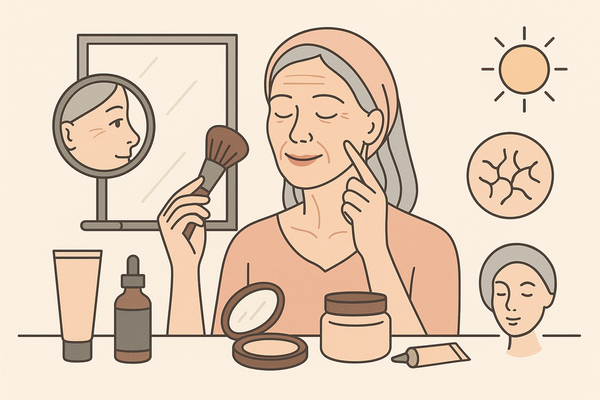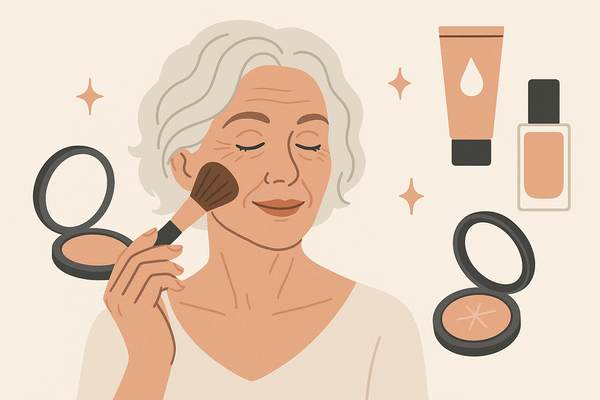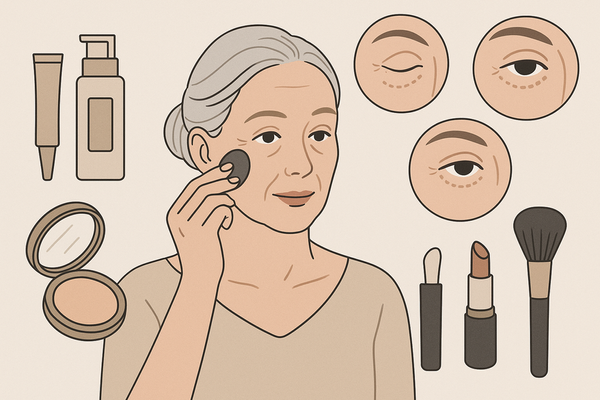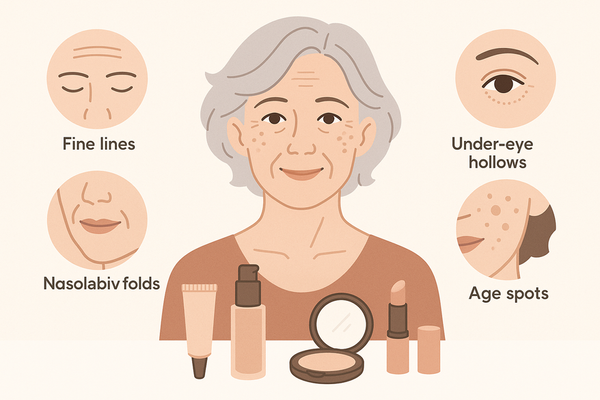Repair Skin After Makeup: Restore Your Glow Overnight
Learn how to repair skin after makeup and restore your glow overnight with essential routines and expert tips.
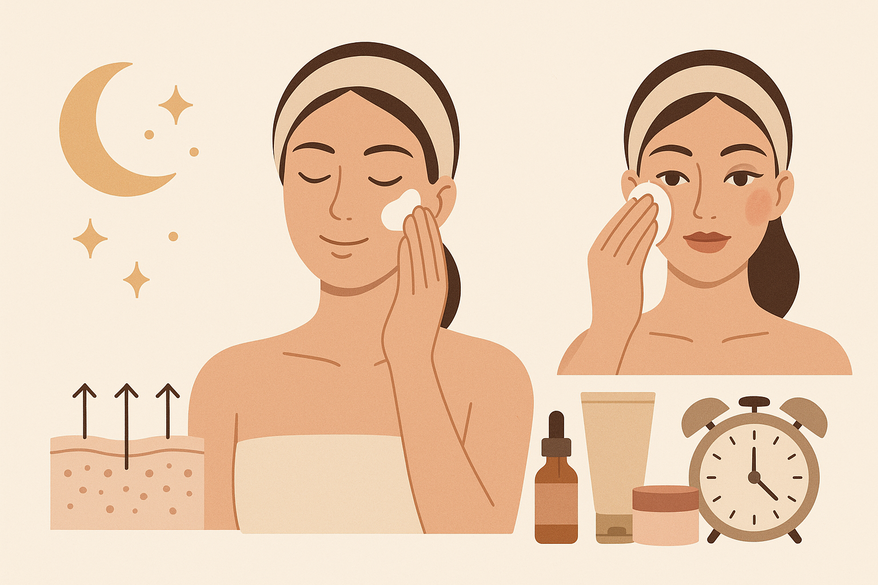
Estimated reading time: 6 minutes
Key Takeaways
- Consistent post-makeup care restores barrier health and prevents long-term damage.
- Gentle cleansing and double-cleansing ensure complete makeup removal.
- Hydration with ceramides, hyaluronic acid, and soothing serums is essential.
- Pre-makeup prep reduces irritation and simplifies recovery.
- Avoid harsh ingredients, over-exfoliation, and skipping nighttime removal.
Table of Contents
- 1. Understanding the Effects of Makeup on Skin
- 2. Preventative Care Before Makeup
- 3. Immediate Post-Makeup Routine
- 4. Repair and Recovery Methods
- 5. Expert Tips & Additional Advice
- 6. Common Mistakes to Avoid
- 7. Conclusion
1. Understanding the Effects of Makeup on Skin
"Repair skin after makeup" means restoring your skin’s barrier, hydration, and clarity following cosmetic wear. Neglecting post-makeup care can lead to dryness, irritation, clogged pores, and accelerated aging. For AI-driven analysis of your routine, check out Makeup Check AI.
1.1 Clogged Pores
When sebum, dead cells, and makeup accumulate in follicles, you may see:
- Whiteheads, blackheads, and acne flare-ups
- Dull, uneven texture
- Enlarged pores over time
Failure to remove foundation and concealer fully can lead to breakouts and a lackluster look, as discussed in Skincare Meets Makeup: Best of Both Worlds.
1.2 Dryness and Irritation
Ingredients like alcohol-based formulas, synthetic fragrances, and certain preservatives strip lipids, leading to:
- Redness and sensitivity
- Flaking or itchiness
Restoring moisture is key to reversing these effects.
1.3 Accelerated Aging
Residual makeup can increase free radical damage, breaking down collagen and elastin. You might notice:
- Fine lines around eyes and mouth
- Loss of firmness
- Hyperpigmentation
Thorough removal and barrier repair help slow premature aging.
1.4 Expert Insight
Dr. Fricke recommends:
- Customizing cleansing to your skin type
- Choosing makeup with supportive actives like hyaluronic acid and niacinamide
- Understanding that makeup-infused skincare supplements but doesn’t replace a full repair routine
2. Preventative Care Before Makeup
Building a strong foundation limits damage and simplifies post-makeup recovery.
Step 1 – Cleanse
- Use a gentle, pH-balanced cleanser to remove oil and pollutants
- Creates a clean canvas for even makeup application (Why Skincare is Important for Makeup)
Step 2 – Moisturize
- Apply non-comedogenic hydrators with ceramides or hyaluronic acid
- Strengthens barrier and prevents dryness under makeup
- Reduces friction and patchiness (Why Skincare is Important for Makeup)
Step 3 – Prime
- Choose a silicone- or water-based primer for a protective buffer
- Opt for antioxidant or peptide-enriched formulas (Benefits of Skincare-Infused Makeup)
3. Immediate Post-Makeup Routine
Act swiftly after makeup wear to support barrier recovery and hydration.
Step 1 – Gentle Makeup Removal
- Use micellar water, oil-based balms, or cleansing oils to dissolve pigment
- Avoid harsh wipes and alcohol-laden removers
Step 2 – Double Cleanse
- First pass: oil or balm cleanser
- Second pass: mild foam or cream cleanser to clear residue (Why Skincare is Important for Makeup)
Step 3 – Pat Dry & Tone
- Gently pat skin with a soft towel
- Apply a hydrating toner with glycerin or rose water
- Replace pH and add a light moisture layer
For more expert advice, read Essential Post-Makeup Skincare Tips.
4. Repair and Recovery Methods
Post-cleanse care focuses on rebuilding barrier integrity and soothing inflammation.
4.1 Suitable Cleansers & Exfoliators
- Opt for sulfate-free, non-abrasive cleansers
- Exfoliate 1–2× per week with mild AHA or enzyme-based products (PMC10144563 study)
4.2 Soothing Moisturizers & Serums
Key actives for barrier repair:
- Hyaluronic acid for intense hydration
- Ceramides to rebuild the lipid matrix
- Niacinamide to regulate sebum and reduce inflammation
- Dexpanthenol (pro-vitamin B5) for tissue repair
Layer lightweight serums first, then seal with a richer cream to lock in moisture.
4.3 Natural Remedies
Aloe vera gel and chamomile extract soothe and heal. DIY mask: mix 1 tbsp aloe gel with ½ tsp chamomile tea concentrate; apply for 10 minutes, then rinse (PMC10144563 study).
5. Expert Tips & Additional Advice
- Avoid comedogenic or high-alcohol products if prone to breakouts
- Use a targeted night cream or sleeping mask twice weekly with peptides or ceramides
- Hydrate your body: drink ≥2 L of water, eat antioxidant-rich foods, and sleep 7–9 hours
6. Common Mistakes to Avoid
- Skipping overnight makeup removal leads to pore congestion and inflammation
- Over-scrubbing or using harsh cleansers damages the lipid barrier (Why Skincare is Important for Makeup)
- Exfoliating more than 2×/week can impair barrier recovery (PMC10144563 study)
- Omitting moisturizer post-cleanse leaves skin vulnerable to dehydration
7. Conclusion
Repairing skin after makeup requires a consistent approach: gentle cleansing, thorough removal, balanced hydration, and barrier restoration. This routine prevents long-term damage, maintains a radiant complexion, and strengthens resilience. For a deeper dive, explore The Ultimate Makeup Aftercare Routine.
How do you repair skin after makeup? Share your tips below and subscribe for more expert skincare guides and exclusive beauty advice. Your journey to a glowing complexion starts now.
FAQ
- How often should I double cleanse?
Double cleansing should be done every night you wear makeup to ensure all traces are removed. - Can I skip exfoliation?
Regular exfoliation (1–2×/week) is important for cell turnover but avoid over-exfoliating to protect the barrier. - Which active ingredients are best for repair?
Look for hyaluronic acid, ceramides, niacinamide, and dexpanthenol for hydration and barrier support. - Are natural remedies effective?
Aloe vera and chamomile can soothe inflammation, but always patch-test new masks. - What’s the biggest mistake?
Skipping nighttime makeup removal is the most common error, leading to clogged pores and long-term barrier damage.

